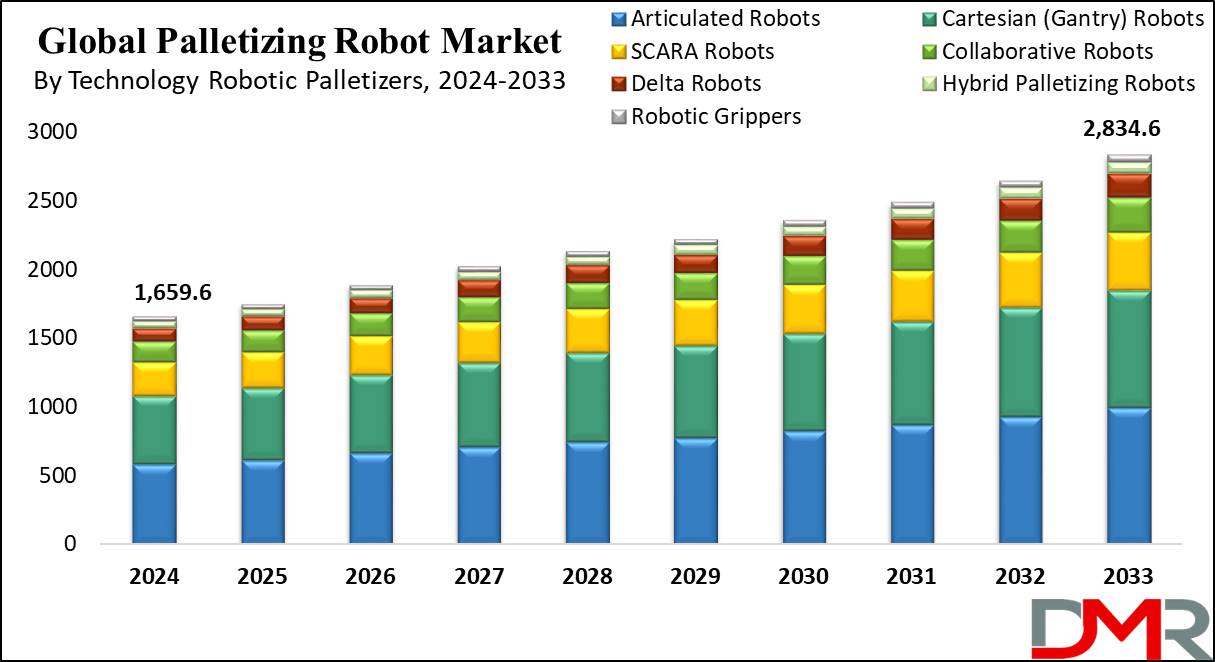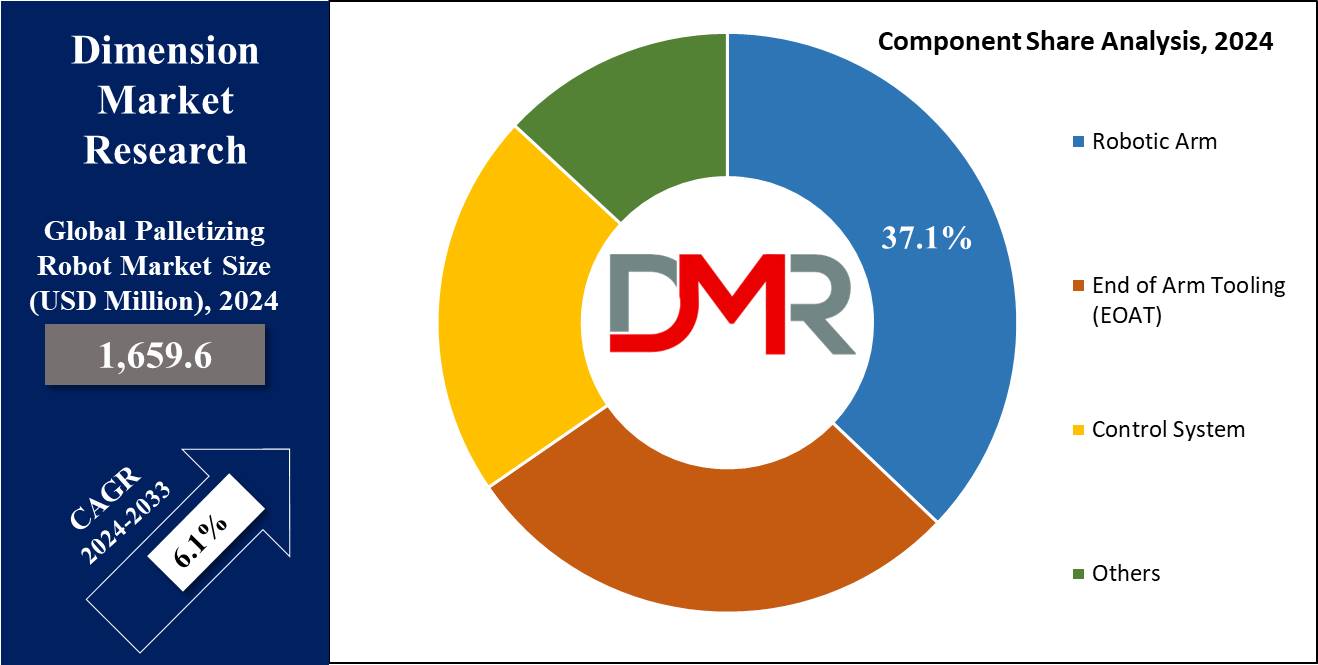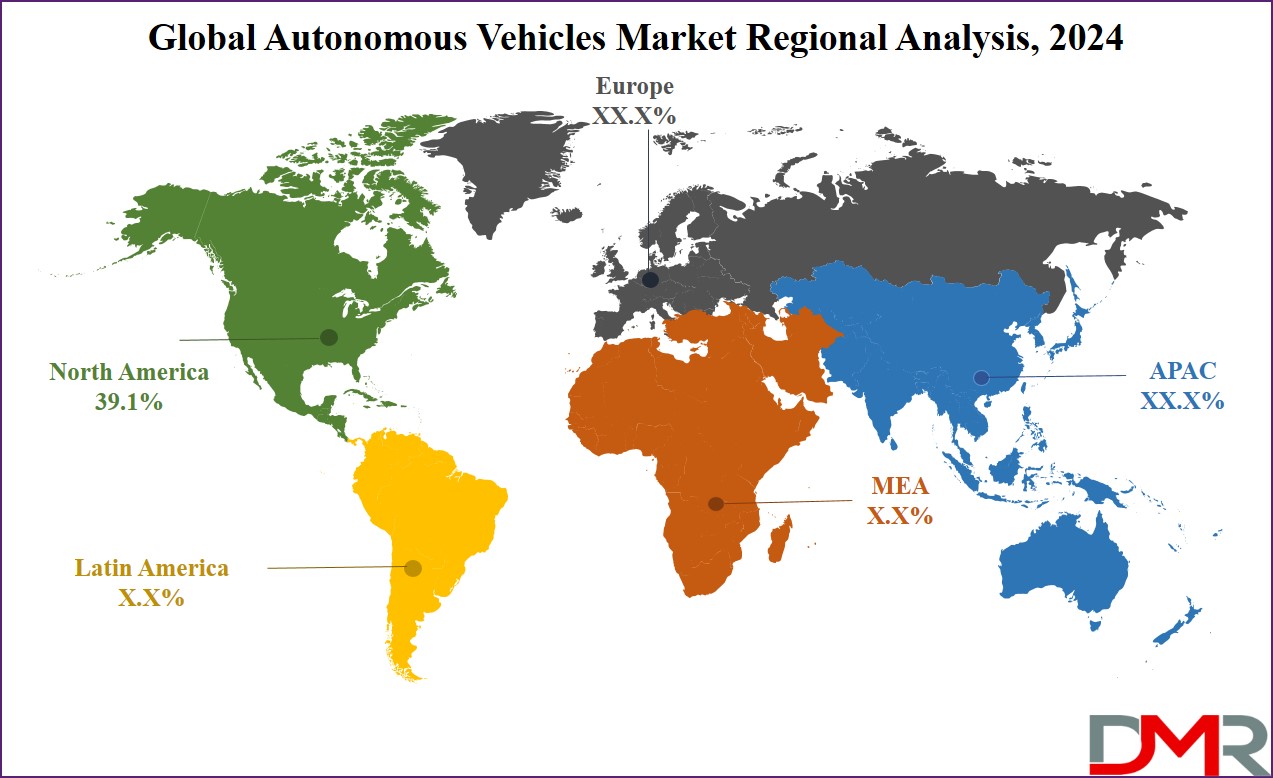New York, Nov. 18, 2024 (GLOBE NEWSWIRE) -- Overview
The Global Palletizing Robot Market is projected to reach USD 1,659.6 million in 2024 which is further anticipated to reach USD 2,834.6 million by 2033 at a CAGR of 6.1%.
The palletizing robot market has felt the increasing demand from several industries due to automation. This palletizing robot increases productivity by efficiently arranging several products, such as boxes and cases, on the pallets. Key applications in e-commerce, manufacturing, and food and beverages further accelerate the demand for palletizing robots.
These robots may also perform a lot of complex tasks with advanced AI and machine learning while optimizing space. Therefore, by obtaining advantages in safety and productivity, cobots are also growing in popularity for small and medium-scale businesses. While North America and Europe are leading the market, it is the Asia-Pacific that grows the fastest owing to the industrialization of China and India.
Click to Request Sample Report and Drive Impactful Decisions: https://dimensionmarketresearch.com/report/palletizing-robot-market/request-sample/

The US Palletizing Robot Market
The US Palletizing Robot Market with an estimated value of USD 547.1 million in 2024 is projected to increase at a compound annual growth rate of 5.7% until reaching USD 903.5 million by 2033.
The U.S. palletizing robot market has been developing well with growing demands from food and beverages, e-commerce, and pharmaceutical industries for automated systems. Growth in robotic technologies, along with increased labor costs, are some of the other major factors driving this market. With this, several companies have been investing in R&D related to flexible and scalable palletizing solutions.
A key trend is the adoption of collaborative robots or cobots that enhance productivity while working with humans. Also, the incorporation of AI and machine learning enhances accuracy and adaptability into unique packaging formats. The introduction of advanced robotic arms in medium to high payload applications further impels warehouse automation and supply chain efficiency in the U.S. market.
Important Insights
- Global Value: This market is estimated to reach USD 1,659.6 million in 2024 and is projected to grow to USD 2,834.6 million by the end of 2033.
- S. Market Value: The U.S. palletizing robot market is expected to be valued at USD 903.5 million by 2033, up from USD 547.1 million in 2024, reflecting a CAGR of 5.7%.
- Regional Analysis: North America is forecasted to hold the largest market share in the global palletizing robot market, with approximately 39.2% in 2024.
- Component Segment Insights: Robotic arms are anticipated to dominate the component segment, accounting for 37.1% of the market share in 2024.
- Robotic Palletizers Technology Insights: Articulated robots are expected to lead the technology segment of robotic palletizers, with a 35.0% market share in 2024.
- Key Players: Major players in the global palletizing robot market include Yaskawa Electric Corporation, Kawasaki Heavy Industries Ltd., Mitsubishi Electric Corporation, and ABB Ltd., among others.
- Global Growth Rate: The market is projected to grow at a CAGR of 6.1% over the forecast period.
Latest Trends
- AI and machine learning are palletizing robots that transform to learn from the operational data obtained and thereby create dynamic changes in the processes. Increasingly higher demands for flexibility and efficiency, especially in industries with very high variability in product handling like e-commerce and retail, spur improvements in precision and velocity.
- There is an appearance of the emergence of collaborative robots or cobots in the palletizing market. This is because, with advanced sensors, they adjust operations to avoid accidents by working safely alongside human operators. Due to that fact, they are also suitable for respective industries depending on precision, such as pharmaceuticals. They are cost-effective and, hence very easy to integrate, reducing the need for SMEs to make many infrastructure changes.
Palletizing Robot Market: Competitive Landscape
The palletizing robot market is considered to be very competitive globally, dominated by leading companies with innovation and strategic alliances. These players are investing a fortune in AI, Machine Learning, and Sensor Technologies to give users the edge they want in robotic solutions.
Industry standards for precision and flexibility are set by ABB's IRB series and FANUC's collaborative robots. This, in turn, finds further expansion supported by such growth in demand for modular and customizable systems across industries. Regional players, especially from the Asia-Pacific region, provide cost-effective solutions catering to local markets. Mergers and acquisitions form another important strategy in global growth and technological advancement.
Some of the prominent market players:
- FANUC Corporation
- Yaskawa Electric Corporation
- Kawasaki Heavy Industries, Ltd.
- Mitsubishi Electric Corporation
- ABB Ltd.
- KUKA AG
- Siemens AG
- Schneider Electric SE
- Honeywell International Inc.
- Columbia/Okura LLC
- Fuji Robotics
- Universal Robots A/S
- Other Key Players
Transform your business approach with strategic insights from our report. Get in touch to request our brochure today at https://dimensionmarketresearch.com/report/palletizing-robot-market/download-reports-excerpt/
Palletizing Robot Market Scope
| Report Highlights | Details |
| Market Size (2023) | USD 1,659.6 Mn |
| Forecast Value (2032) | USD 2,834.6 Mn |
| CAGR (2023-2032) | 6.1% |
| The US Market Size (2024) | USD 547.1 Mn |
| Leading Region in terms of Revenue Share | North America |
| Percentage of Revenue Share by Leading Region | 39.2% |
| Historical Data | 2018 - 2023 |
| Forecast Data | 2024 - 2033 |
| Base Year | 2023 |
| Estimate Year | 2024 |
| Segments Covered | By Component, By Technology Robotic Palletizers, By Payload Capacity, By Application, By End User |
| Regional Coverage | North America, Europe, Asia Pacific, Latin America, Middle East & Africa (MEA) |
Market Analysis
Robotic arms are projected to dominate the palletizing robot market, holding a 37.1% market share in 2024. These are great factors: precision, adaptability, and ideal for repetitive operations in food and beverages, pharmaceuticals, and manufacturing. The robotic arms can efficiently deal with products of various shapes and weights with minimal human supervision, thanks to advanced sensors and AI investment. This makes the robots very accessible and applicable in several industries, ranging from medium to heavy payloads, for example: automotive and logistics. The demand for robotic arms by different companies to optimize their operational efficiency has set a trend and is expected to drive continued market dominance.

Palletizing Robot Market Segmentation
By Component
- Robotic Arm
- End of Arm Tooling (EOAT)
- Control System
- Others
By Technology Robotic Palletizers
- Articulated Robots
- Cartesian (Gantry) Robots
- SCARA Robots (Selective Compliance Assembly Robot Arm)
- Collaborative Robots (Cobots)
- Delta Robots
- Hybrid Palletizing Robots
- Robotic Grippers
- Vacuum Grippers
- Magnetic Grippers
- Mechanical Grippers
By Payload Capacity
- Low Payload (Up to 100 kg)
- Medium Payload (101–500 kg)
- High Payload (Above 500 kg)
By Application
- Case Palletizing
- Bag Palletizing
- Bottle Palletizing
- Drum Palletizing
By End User
- Food & Beverage
- Pharmaceutical
- Consumer Goods
- Chemical
- Logistics & Warehousing
Purchase the Competition Analysis Dashboard Today at https://dimensionmarketresearch.com/checkout/palletizing-robot-market/
Growth Drivers
- The surge in e-commerce, especially post-pandemic, has generated greater demand for automated warehousing, and palletizing robots help speed up the sorting and packaging process. Companies like Amazon and Alibaba, which deal with immense order volumes, rely on palletizing robots to accelerate their product delivery chain. This trend will translate into higher demand by consumers, even for fast deliveries.
- The pandemic accelerated the shortage of labor that finally pushed companies to head towards automation in developed economies. Palletizing robots reduces human labor and increases productivity with minimal errors. They can work uninterruptedly to raise efficiency and reduce long-term costs.
Restraints
- The high costs of purchasing and installing palletizing robots present a major barrier, particularly for SMEs. Although long-term benefits may outweigh initial expenses, the financial burden remains significant.
- It may be difficult to implement and/or maintain robotic systems. Robotic systems often require specialized technicians to set up and troubleshoot. Integrating these robots into an existing production line may cause problems that could lead to inefficiencies in production.
Growth Opportunities
- Most of the emergent markets in the APAC and Latin American regions have bright prospects to exhibit strong growth potential for palletizing robots. Infrastructural development, coupled with government investments in automation, fuels the demand pertaining to palletizing robots chiefly in the food and beverages industry and pharmaceuticals.
- Modularity, a palletizing system that offers customized solutions to versatile needs assures ease of scaling up any business operation to adapt to fluctuating demand with minimum downtime gain in operational flexibility.
Click to Request Sample Report and Drive Impactful Decisions at https://dimensionmarketresearch.com/report/palletizing-robot-market/request-sample/
Regional Analysis
North America is expected to lead the global palletizing robot market, commanding 39.2% of the market share by 2024. North America, with its well-established advanced industrial base, the high degree of dispersion of automation, and focus on efficient operations, is likely to drive the palletizing robot market globally.
Robotic palletizing systems find large applications across industries such as food and beverages, e-commerce, and pharmaceuticals that aim at increased productivity and lower labor costs. Labor shortages and rising wages add to the compulsion to automate. Also, favorable regulations encourage automation in safety and efficiency, while the usage of technologies such as AI and cobot boost adoptions.

By Region
North America
- The U.S.
- Canada
Europe
- Germany
- The U.K.
- France
- Italy
- Russia
- Spain
- Benelux
- Nordic
- Rest of Europe
Asia-Pacific
- China
- Japan
- South Korea
- India
- ANZ
- ASEAN
- Rest of Asia-Pacific
Latin America
- Brazil
- Mexico
- Argentina
- Colombia
- Rest of Latin America
Middle East & Africa
- Saudi Arabia
- UAE
- South Africa
- Israel
- Egypt
- Rest of MEA
Recent Developments in the Palletizing Robot Market
- August 2024: ABB launched its new IRB 1300 palletizing robot, which features enhanced AI-driven functionalities for faster and more precise palletizing in the food and beverage sectors.
- July 2024: Fanuc Corporation announced a strategic partnership with Covariant to integrate AI-based decision-making in their collaborative palletizing robots, focusing on improving real-time adaptability in packaging lines.
- May 2024: Yaskawa introduced its latest collaborative robot designed specifically for medium payload (101–500 kg) palletizing applications in manufacturing and pharmaceuticals, offering enhanced safety and precision.
- March 2024: KUKA AG expanded its presence in the U.S. market by opening a new robotic research and development center to drive innovation in palletizing robot solutions, targeting the growing e-commerce and logistics sectors.
- January 2024: ABB announced a partnership with a leading logistics company to develop next-generation palletizing systems equipped with machine vision technology, aimed at improving the accuracy and speed of palletizing operations.
Discover additional reports tailored to your industry needs
The Global Data Science Platform Market size is expected to reach a value of USD 167.5 billion in 2024, and it is further anticipated to reach a market value of USD 1,621.2 billion by 2033 at a CAGR of 28.7%.
The Global Data Integration Software Market size is expected to reach a value of USD 7.3 billion in 2024, and it is further anticipated to reach a market value of USD 20.1 billion by 2033 at a CAGR of 11.9%.
The Global Cloud Services Market size is expected to reach a value of USD 644.5 billion in 2024, and it is further anticipated to reach a market value of USD 2,466.1 billion by 2033 at a CAGR of 16.1%.
The Global Artificial Intelligence in Breast Imaging Market size is expected to reach a value of USD 7,913.1 million in 2024, and it is further anticipated to reach a market value of USD 85,443.3 million by 2033 at a CAGR of 30.4%.
The Global Advanced Robotics Market is forecasted to reach USD 47.5 billion by the end of 2024 and grow to USD 260.9 billion in 2033, with a CAGR of 20.8%.
Global Space Tourism Market is forecasted to reach USD 1,313.8 million by the end of 2024 and is predicted to grow to USD 40,399.0 million in 2033 with a CAGR of 46.3%.
Global Voice and Speech Recognition Market is forecasted to reach USD 24.6 billion by the end of 2024 and is predicted to grow to USD 87.6 billion in 2033 with a CAGR of 15.1%.
Global Sponge Counting System Market is projected to reach USD 198.9 million by the end of 2024 and grow exponentially to an anticipated value of USD 358.1 million in 2033 at a CAGR of 6.8%.
The Global Digital Twin Market is forecasted to reach USD 24.3 billion by the end of 2024 and grow to USD 412.0 billion in 2033, with a CAGR of 36.9%.
The Global Green Technology & Sustainability Market is forecasted to reach USD 29.0 billion by the end of 2024 and grow to USD 193.9 billion in 2033, with a CAGR of 23.5%.
About Dimension Market Research (DMR):
Dimension Market Research (DMR) is a market research and consulting firm based in India & US, with its headquarters located in the USA (New York). The company believes in providing the best and most valuable data to its customers using the best resources analysts work, to create unmatchable insights into the industries, and markets while offering in-depth results of over 30 industries, and all major regions across the world. We also believe that our clients don’t always want what they see, so we provide customized reports as well, as per their specific requirements to create the best possible outcomes for them and enhance their business through our data and insights in every possible way.
